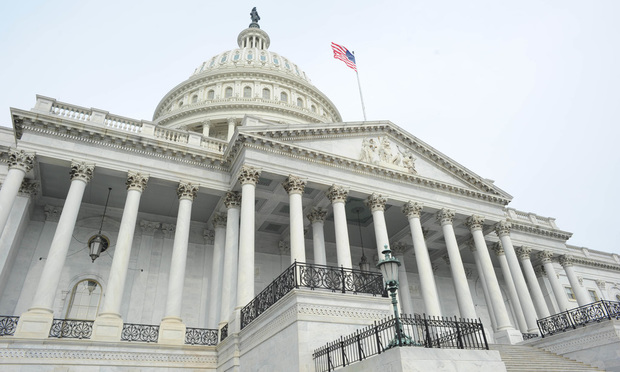Senate Overwhelmingly Approves Sex Trafficking Bill to Amend Section 230
The bill—which is expected to be signed into law by President Trump—would create new civil and criminal liability for internet companies.
March 21, 2018 at 05:47 PM
3 minute read

The U.S. Senate on Wednesday overwhelmingly approved legislation amending Section 230 of the Communications Decency Act to allow civil and criminal sex trafficking-related claims against internet companies, sending the bill to the White House.
The Allow States and Victims to Fight Online Sex Trafficking Act, or FOSTA (H.R. 1865), was approved in a vote of 97-2. The only lawmakers voting against the bill were Oregon Democrat Ron Wyden, who co-authored Section 230, and Kentucky Republican Rand Paul. Sen. John McCain, R-Arizona, did not vote, although he supported the bill.
A proposed amendment by Wyden to help fund sex-trafficking enforcement was defeated. Wyden withdrew a separate proposed amendment that aimed to expressly shield internet companies from legal liability, if they actively moderated their forums.
President Donald Trump is expected to sign the bill into law. After the House approved H.R. 1865 at the end of February, White House Press Secretary Sarah Sanders called the legislation “an important step forward” in the fight against sex trafficking.
Critics of the bill, however, have said the legislation is vaguely worded and will not only be counterproductive—by forcing sex-trafficking operations further underground—but also hinder internet freedom by exposing companies to litigation over user content.
The Electronic Frontier Foundation said in a statement that, in the wake of the bill's passage, “online platforms will have little choice but to become much more restrictive in what sorts of discussion—and what sorts of users—they allow, censoring innocent people in the process.”
The bill expands existing criminal sex-trafficking law to rope in facilitation of trafficking by web sites. It also makes those provisions retroactive, which the Justice Department has said is probably unconstitutional.
Earlier drafts of the legislation were strongly opposed by the Internet Association, which represents companies including Google, Facebook, Twitter and Reddit. But the organization changed its position after tweaks were made.
In a tweet, Wyden took a shot at internet companies for not taking a stand against the bill. “We are in a fight for the Internet every day. Big Internet companies are NOT engaged in this fight – Their only interest is currying favor with the nations where they wish to do business,” he wrote.
The impetus for the legislation was Backpage.com, the online classified ad site that a Senate investigation found had “knowingly concealed” evidence of criminal sex trafficking through its site and facilitated child sex trafficking.
That investigation was led by Sens. Rob Portman, R-Ohio, and Claire McCaskill, D-Missouri, who championed the FOSTA bill and its earlier Senate version, called SESTA.
“Today's vote is a victory for trafficking survivors and a victory for our efforts to help stop the selling of women and children online,” Portman said in a statement, adding that the legislation “will ensure justice for trafficking victims and help us combat this evil crime.”
This content has been archived. It is available through our partners, LexisNexis® and Bloomberg Law.
To view this content, please continue to their sites.
Not a Lexis Subscriber?
Subscribe Now
Not a Bloomberg Law Subscriber?
Subscribe Now
NOT FOR REPRINT
© 2025 ALM Global, LLC, All Rights Reserved. Request academic re-use from www.copyright.com. All other uses, submit a request to [email protected]. For more information visit Asset & Logo Licensing.
You Might Like
View All
Meta agrees to pay $25 million to settle lawsuit from Trump after Jan. 6 suspension
4 minute read
How We Won It: Latham Secures Back-to-Back ITC Patent Wins for California Companies
6 minute read
Trending Stories
- 1Two Wilkinson Stekloff Associates Among Victims of DC Plane Crash
- 2Two More Victims Alleged in New Sean Combs Sex Trafficking Indictment
- 3Jackson Lewis Leaders Discuss Firm's Innovation Efforts, From Prompt-a-Thons to Gen AI Pilots
- 4Trump's DOJ Files Lawsuit Seeking to Block $14B Tech Merger
- 5'No Retributive Actions,' Kash Patel Pledges if Confirmed to FBI
Who Got The Work
J. Brugh Lower of Gibbons has entered an appearance for industrial equipment supplier Devco Corporation in a pending trademark infringement lawsuit. The suit, accusing the defendant of selling knock-off Graco products, was filed Dec. 18 in New Jersey District Court by Rivkin Radler on behalf of Graco Inc. and Graco Minnesota. The case, assigned to U.S. District Judge Zahid N. Quraishi, is 3:24-cv-11294, Graco Inc. et al v. Devco Corporation.
Who Got The Work
Rebecca Maller-Stein and Kent A. Yalowitz of Arnold & Porter Kaye Scholer have entered their appearances for Hanaco Venture Capital and its executives, Lior Prosor and David Frankel, in a pending securities lawsuit. The action, filed on Dec. 24 in New York Southern District Court by Zell, Aron & Co. on behalf of Goldeneye Advisors, accuses the defendants of negligently and fraudulently managing the plaintiff's $1 million investment. The case, assigned to U.S. District Judge Vernon S. Broderick, is 1:24-cv-09918, Goldeneye Advisors, LLC v. Hanaco Venture Capital, Ltd. et al.
Who Got The Work
Attorneys from A&O Shearman has stepped in as defense counsel for Toronto-Dominion Bank and other defendants in a pending securities class action. The suit, filed Dec. 11 in New York Southern District Court by Bleichmar Fonti & Auld, accuses the defendants of concealing the bank's 'pervasive' deficiencies in regards to its compliance with the Bank Secrecy Act and the quality of its anti-money laundering controls. The case, assigned to U.S. District Judge Arun Subramanian, is 1:24-cv-09445, Gonzalez v. The Toronto-Dominion Bank et al.
Who Got The Work
Crown Castle International, a Pennsylvania company providing shared communications infrastructure, has turned to Luke D. Wolf of Gordon Rees Scully Mansukhani to fend off a pending breach-of-contract lawsuit. The court action, filed Nov. 25 in Michigan Eastern District Court by Hooper Hathaway PC on behalf of The Town Residences LLC, accuses Crown Castle of failing to transfer approximately $30,000 in utility payments from T-Mobile in breach of a roof-top lease and assignment agreement. The case, assigned to U.S. District Judge Susan K. Declercq, is 2:24-cv-13131, The Town Residences LLC v. T-Mobile US, Inc. et al.
Who Got The Work
Wilfred P. Coronato and Daniel M. Schwartz of McCarter & English have stepped in as defense counsel to Electrolux Home Products Inc. in a pending product liability lawsuit. The court action, filed Nov. 26 in New York Eastern District Court by Poulos Lopiccolo PC and Nagel Rice LLP on behalf of David Stern, alleges that the defendant's refrigerators’ drawers and shelving repeatedly break and fall apart within months after purchase. The case, assigned to U.S. District Judge Joan M. Azrack, is 2:24-cv-08204, Stern v. Electrolux Home Products, Inc.
Featured Firms
Law Offices of Gary Martin Hays & Associates, P.C.
(470) 294-1674
Law Offices of Mark E. Salomone
(857) 444-6468
Smith & Hassler
(713) 739-1250







